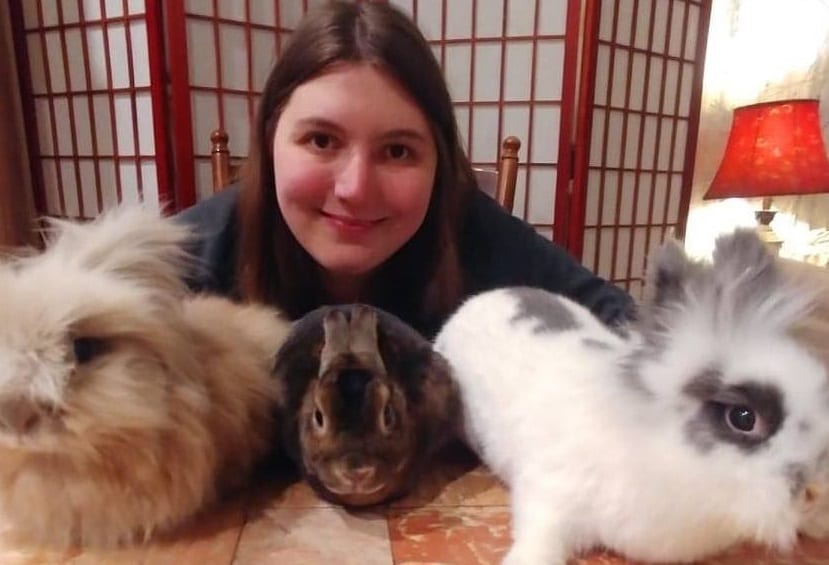Call it the Domino effect.
Natalie Pitheckoff, a gerontology PhD candidate at UMass Boston, has spent years observing and studying the impact of pets on older adults, particularly those with Alzheimer’s or other dementias. Her proposed PhD dissertation involves analyzing the policies and practices of nursing homes when it comes to human-animal interactions.
Pitheckoff was recently awarded a dissertation grant to support her work from the UCLA Law School’s Animal Law and Policy Small Grants Program. The program is funded by Bob Barker, the retired television game show host and long-time animal rights supporter.
Pitheckoff first became interested in the impact of animals on older adults about eight years ago. After completing her undergraduate degree, she took a job as an activity director in a dementia care unit for an assisted living facility in New Rochelle, N.Y. She suggested bringing her pet rabbit to work to interact with the residents, an idea initially met with skepticism by her supervisor who recalled a less than successful previous experiment with a visiting dog.
But the rabbit, Domino, soon made an appearance. He was an immediate hit.
“I put him in a basket and passed the basket around,” said Pitheckoff. “The residents had such a positive reaction, it was great. I had residents who never spoke, but they would speak to the rabbit while petting him.”
Pitheckoff later received a master’s degree in gerontology from Miami University and then moved to begin her PhD work at UMass Boston in 2015. Coverage of her research on a very different topic, the growing challenge of Bulgaria’s aging population, appeared on the Gerontology Institute Blog in 2017. Now she’s preparing to start data collection since successfully defending her proposed dissertation topic earlier this month.
As part of her research, Pitheckoff intends to study the perspectives of national and state-level organizations on human-animal interactions. She plans to survey nursing homes in New York State on their relevant policies and estimate the prevalence of facilities providing human-animal interactions. She also intends to explore nursing home characteristics that predict the likelihood of having human-animal interactions and investigate staff attitudes on the therapeutic use of animals in selected nursing homes.
“More research has begun to empirically show numerous positive health effects of interacting with animals,” said Pitheckoff. “This is especially true for older adults living in residential care facilities.
“Anecdotally, we know thousands of facilities across the U.S. offer ‘pet therapy’ programs but there is a real lack of clarity about procedures, policies and practices that govern these interactions. My dissertation will hopefully uncover best practice recommendations that can help more care settings adopt human-animal interactions,” she said.
Pitheckoff is currently working on her dissertation research from Buffalo, N.Y., where she shares her home with her fiancé and three rabbits: Madame Bushwick, Sir Ziggy and Gizmo.


May 17, 2019 at 1:43 pm
This is a very worthwhile subject. The benefits of visiting animals on the sick and elderly are well known, alas it is required that there be a formal study before it can be accepted. I wish Natilie good luck with her Dissertation.
February 17, 2021 at 4:26 am
Thank you, good article.
–
LGBTI News